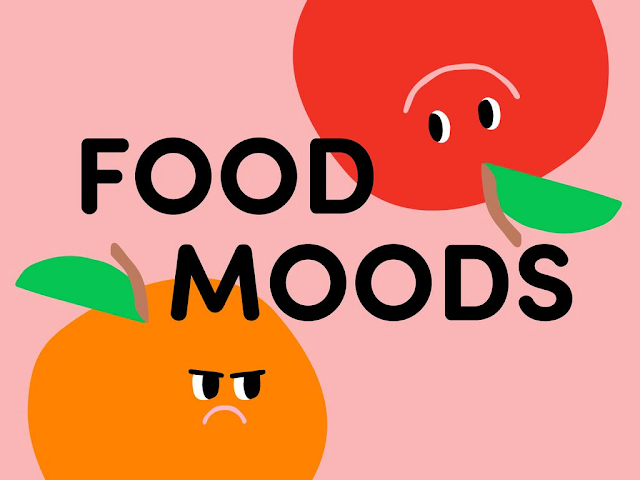Mood And Food
Mood And Food
What is the Relationship Between Food and Mood? It is well known that unhealthy eating patterns can cause mood swings. Blood sugar fluctuations and nutritional imbalances are often to blame. Without a steady source of fuel from the foods we eat, our mind and bodies don't function well.
What we eat plays an important role in how we feel. it is scientific fact that deficiencies in some essential vitamins, minerals and nutrients can lead to symptoms associated with stress, depression, behavioral problems and physical disease.
Introduction
When you are faced with a stressful situation your body eagerly consumes these nutrients, leaving you in short supply. Unless you replenish the stock, your stress symptoms, initially caused by a situation or event, will continue longer than normal because your body has been depleted of the essential nutrients that it need for optimum brain function.
Many people are seeking to take control of their mental health using self help, and to find approaches they can use along side, or even instead of, prescribed medication. One self help strategy is to make changes to what we eat , and there is a growing interest in how food and nutrition can effect emotional and mental health.
How does food affect Mood?
Cause effect relationship between food and mood.
- Fluctuations in blood sugar levels are associated with changes in mood and energy. and are affected by what we eat.
- Brain chemicals (neuro-transmitters, such a serotonin, dopamine and acetylcholine) influence the way we think, feel and behave. They can be affected by what we eat.
- There can be abnormal reactions to artificial chemicals in foods, such as artificial coloring and flavorings.
- There are reactions that can be due to the deficiency of an enzyme needed to digest food
- Lactase, for instance, is needed to digest lactose milk (milk sugar). Without it , milk intolerance, can build up.
- People can become hypersensitive to food . This can cause what are known as delayed or hidden food allergies or sensitivities.
- Low levels of vitamins minerals and essential fatty acids can affect mental health, with some symptoms associated with particular nutritional deficiencies. For example, linkes have been demonstrated between low levels of certain B vitamins and symptoms of schizophrenia, levels of the mineral zinc and eating disorders, and low levels of omega 3 oils and depression.
It is generally accepted that how we feel can influence what we choose to eat or drink (mood to food) What is less well known is how what we eat can effect our mental functioning.
The use of caffeine is one example of a complex relationship. Caffeine found in tea, coffee, cola drinks and chocolate is probably the most widely used behavior modified drug in the world. We often choose to drink it if we are feeling tired and irritable , because it can give us a boost and help us to concentrate.
Having a cup of coffee or tea also has a lot of psychological associations. we need a friend for 'coffee and a chat' or give ourselves a break by sitting down with a cup of tea, and these things are very important.
But too much caffeine (which is a different amount for us) can cause symptoms, such as anxiety, nervousness and depression. Any exploration into food and mood needs to take into account this two way relationship an include the psychological aspect behind what we are choosing to eat.
So what are these essential nutrients, how can they help and what can you eat to make sure your body and mind has the fuel if needs to run properly.
Deficiencies in the following list of nutrients have all been linked to issue with mental health.
- B1- Poor concentration.
- B3-Depression , stress.
- B5- poor memory.
- B6- depression, poor memory, irritablity, stress
- B12- poor memory, confusion.
- Folic acid- anxiety , depression
- Magnesium-anxiety, depression, irritablity, stress, insomnia.
- Vitamin C-depression.
- Selenium-depression, irritablity.
- Zinc- depression, confusion, blank, mind, loss of appetite, lack of motivation.
- Omega 3- depression por memory.
- Tryptophan- depression.
Unlock your brain power
There are three important aspects to mental performances
Dhi - learning and comprehension, govern by vata dosha
Dhriti - processing and retention of knowledge, the realm of pitta dosha,
Smriti = memory or recall, controlled by kapha dosha.
For the best mental performance and realization of the fullest mental potential, each of these factors individually needs to be at its peak and more important, the coordination among the three factors also need to be optimal.
Eat pure, "intelligent food"
It is very important to eat foods that are natural and pure for their full benefit to be absorbed by the body. When foods are as close to their state in nature as possible that is When they deliver the most potent nutrition. Foods that have been genetically altered processed or refined have much of their natural intelligence stripped from them, and they disturb the intellect and the coordination among the three aspect of mental prowess.
Also taboo are foods that are canned or preserved with artificial additives and preservatives or food with artificial colors and flavors. Cooking with fresh organic ingredients can take a little more time and effort. But your brain , and indeed your entire physiology, will thank you for it and repay the effort with accelerated performance.
Maintain a supply of balanced nutrition
The recommended diet is vegetarian grains, beans and legumes provide nutrient for the brain. Be sure to include plenty of cooked leafy greens, several helping of fruits and vegetables are recommended. Sweet juicy fruits are excellent cleansers; they help flush toxins out of the body. Freshly squeezed fruit juices deliver nutrients quickly to your mind and body.
Do not count fat out entirely; Fats perform some essential functions in the body, including the brain. Ghee is recommended which is valued for its ability to transport the benefits of herbs and spices to the brain and to other parts of the body. Eat ghee in moderation. Include some dairy if you are not lactose intolerant, such as cow's milk and fresh curds. Almonds and walnuts are also excellent brain foods and mood alleviators.
Cutting down on empty junk foods and surged drinks that interfere with the absorptions of nutrients by the body., sweet fruits, raisins, and dates are a much better option when you need something sweet.
Spices are crucial addition to a mood enhancing diet. Many spices enhance digestion and facilitate the clearing of toxins from the body, This means that the channels of the body , including those that serve the brain, will be clear. Black pepper in small quantities is particularly recommended for clearing the channels of the brain and promoting the free flow of oxygen to the brain.
Exposure to heavy metals such as lead and aluminum has been shown to be damaging for the brain. Also avoid alcohol and caffeine.
Good eating habits are as important as what you eat. Sitting down to eat, focusing on food rather than on work or other activities. and savoring the meal are important. Ice cold drinks disrupt digestion and impair the assimilation of nutrients by the body and should therefore be avoided.
Food is determinant of your mental and physical health. The mind and body are inseparable. Food and mind can have a domino effect on mental health. Burgers, sugary snacks and other unhealthy foods can trigger mental depression
One of the most obvious, yet under -recognized factors in the development of major trends in mental health is the role of nutrition. The body of evidence linking diet and mental health is growing, at a rapid pace. As well as its impact on short and long term mental health. The evidence indicates that food plays an important contributing role in the development role in the development, management and prevention of specific mental health problems such as depression, schizophrenia, attention deficit, hyperactivity disorder, and Alzheimer's disease.
Nearly two third of those who do not report daily mental health problems eat fresh fruit or fruit juice every day compared with less than half of those who do report daily mental health problems. This pattern is similar for fresh vegetables and salad. Those who report some level of mental health problem also eat fewer healthier foods (fresh fruits and vegetables, organic foods and meals made from scratch) and more unhealthy foods (chips, and crisps, chocolate, ready meals and takeaways.)
A balanced mood and feelings of wellbeing can be protected by ensuring that our diet provides adequate amounts of complex carbohydrates essential fats, amino acids, vitamins and minerals and water.
Food is divided into three categories Satvic, rajsik and tamsik. Satvik food helps you to attain a calm, peaceful and alert mind. Rajsik foods can make you feel restless and agitated and tamsik foods induce dullness and lethargy.
Sattvik foods include fresh vegetables and fruits that grow above the ground. Some cereals, whole grains and unrefined grains fall in this category , as do legumes, nuts, sprouting seeds, honey , herbs (including herbal teas) and some dairy products.
Rajsik foods are spicy hot, bitter, sour, gaseous and pungent. While tamsik foods include stale, fermented, microwaved, canned, deep fried, processed foods containing high amount of preservatives and coloring.
If eating certain foods triggers a poor mental health, neglecting a few foods can lead to depression, There is a close connection between our thoughts and the food we consume. While what you eat may be responsible for your well being, what you feel within is responsible for what you eat as well. For example zinc deficiency has been associated with depression. Similarly consumption of gluten can cause mood disorders in some people who are allergic to it. Depending on the body type of individuals diet pattern work positively and negatively. Foods that are rich in omega 3 fatty acids like flax seeds, walnuts and soyabean support the brain, eyes and nerves. Raw food can also increase clarity of mind by cleansing the body. Eating raw foods helps in the removal of toxins that processed food has left in your system. These toxins often add to the negativity of your mind. It can also lead tp crankiness and irritable behavior.
Eating a diet rich in sodium can lead to poor mental health. Sodium rich foods can cause hypertension and cardiovascular diseases leaving you in an unhappy place. Sugary foods too can cause fluctuations in your mood. More over sugary foods are addictive..
A special class of herbs especially useful for mind called Medhya rasayana. These herbs individually enhance learning, retention and recall and also promote the coordination among the three factors. They provide powerful nourishment for the brain. Shankhapushpi and Brahmi are well known herbs known to promote the health and functioning of the mind.
https://madhuchhandacdmo.blogspot.com/2022/05/mood-and-food.html





Comments
Post a Comment